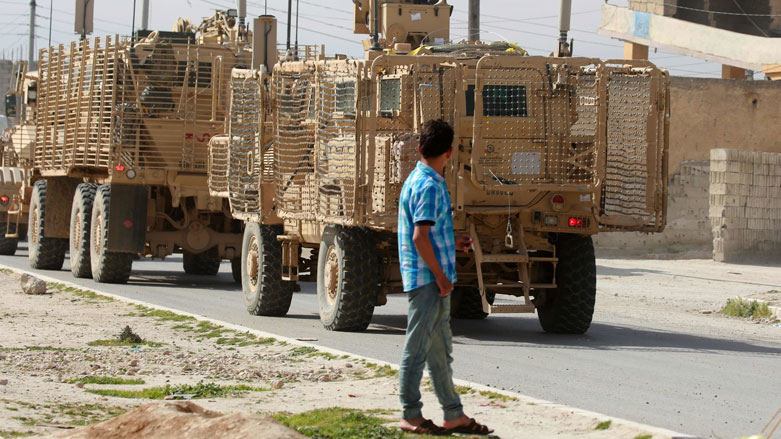Syrian Kurds look to Damascus, Moscow to stop Turkish attack

ERBIL (Kurdistan 24) – Amid repeated Turkish military threats against the northern Syrian city of Manbij, local Kurdish officials have said in the past that they did not wish to “choose” between Damascus or Ankara. After American president Donald Trump’s surprise announcement on Wednesday that he would withdraw US troops from Syria, though, Kurds there are now faced with the prospect of making a deal with Damascus before Turkish attacks begin.
“Now we have Manbij and the east of the Euphrates in front of us. We are working intensively on this subject,” Turkish Defense Minister Hulusi Akar said on Thursday, as reported by Turkish media.
Many residents of Manbij say they do not want to fall victim to Turkey and experience a “second Afrin” scenario, which saw mass displacement and looting by Turkish-backed groups in the early months of 2018.
In the Kurdish town of Kobani, a group of hairdressers speaking to Kurdistan 24 in recent weeks could find no consensus on which might be the worse power to take control of their area; Damascus or Ankara. One argued it would be less destructive if the Syrian government would return while the other said there was no difference between Damascus and Ankara.
The comments came a few weeks after joint Turkish-US patrols, as part of a plan known as the Manbij roadmap, contributed to keeping Turkey out of the city. Just a week ago, the US was credited with stopping Turkish president Recep Tayyip Erdogan from ordering the commencement of an attack.
However, Trump’s announcement on Wednesday has abruptly changed perceptions of what all sides can reasonably expect going forward.
As quickly as Thursday, Turkish-backed groups began firing on positions outside the city held by the Manbij Military Council (MMC). Weeks ago, an MMC media official told Kurdistan 24 that they would resist a Turkish invasion, but this was while US troops were expected to remain indefinitely.
Nazifa Xello, co-chair of the Legislative Council of Manbij and its countryside Civil Administration, had also been adamant on Dec. 6, saying, “We have taken the decision that if the Turkish army or affiliated groups [attack], we will fight.”
Many in Syria expect that the SDF will withdraw its fighters from Islamic State (IS) fronts as far away as Deir al-Zor and Raqqa to redeploy them northward to defend border areas near Manbij, should a major Turkish operation begin.
Faced with a choice between the presence of Turkish or Syrian fighters in Manbij, Mohammed Cumaa Arab, an ethnic Turkmen in the Manbij administration, said in early December that the decision for him was easy. “If we have to choose between Turkey and the regime, of course we will choose the regime.”
When the Turkish attack on Afrin began in January 2017, Russia was seen to have given the Kurds there the choice of either handing over Afrin to Damascus, or else Turkish troops would enter. Now, all those to the east of the Euphrates could face the same decision.
According to Maxwell B. Markusen, Associate Fellow of the Center for Strategic and International Studies (CSIS), the Syrian Kurds “can stay and fight against a Turkish-led incursion, they can withdraw from the territory, or they can negotiate a deal with the Russians and the Assad regime.”
He said that none of these are good options, but added that the Russians are now the Kurds’ best chance for survival.
“A negotiated settlement with the Russians and Assad regime is not likely to give the Kurds the same degree of autonomy enjoyed under the U.S.-led coalition, but would represent a change from the brutal oppression and lack of civil rights that the Kurds faced before the Syrian civil war,” he told Kurdistan 24.
According to Markusen, the Kurds should leverage their strength as a stabilizing force in northeastern Syria, and offer to cooperate with Moscow and Damascus to guard against an IS resurgence in the region.
“The Kurds should also work with Russia and the Assad regime to prevent a Turkish incursion, which could see the forced migration of Kurds into other regions of Syria, and the relocation of Arab, Turkmen, and other Syrian refugees into these Kurdish-held territories.”
Senior Syrian Democratic Council (SDC) official Ilham Ahmed said that all “arrows point to Moscow” for negotiations with Damascus, as reported by Al-Monitor on Thursday.
According to a statement by the Syrian Observatory for Human Rights (SOHR), Kurdish officials and Damascus have already held discussions about handing over oil fields to the Syrian government. Unconfirmed reports contend that the meetings took place in the city of Qamishli (Qamishlo), located right on the Turkish border.
Bassam Ishak, an SDC representative in Washington, did not confirm whether or not such negotiations are taking place, saying only, “SDF was always open to talks with all parties except the terrorists.”
“We always wanted a political solution through Syrian dialogue that doesn't exclude any Syrian group or party,” he concluded.
A 30-year-old Syrian Kurd who did not want his name used when talking to Kurdistan 24 said that he hopes that the Kurdish leadership will strike a deal with Damascus.
Asking that he be referred to only as Azad, he remarked, “It’s better than Turkey and militias.”
Editing by John J. Catherine
